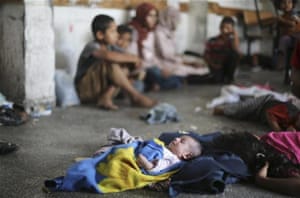
It was a pretty innocuous quote from AFP but it spoke volumes about the disposability of certain lives. "British Prime Minister David Cameron also spoke with [Israeli Prime Minister Benjamin] Netanyahu, reiterating 'the UK's strong support for Israel's right to take proportionate action to defend itself from Gaza rockets, while expressing condolences over the Israeli deaths and concern over the 'mounting civilian casualties in Gaza.'"
How did it come about that the loss of some lives merits grieving and that of others mere concern over the magnitude? How come some people have rights to self-defence while others are expected to patiently endure decades of dispossession, ethnic cleansing and humiliation? Why, as Michael Onsando asked on Twitter, "this insistence that the oppressed need to be 'better people' than the oppressors - why?"
This week too, when Kenya's foreign minister, Ambassador Amina Abdallah, was asked about the country's stand on the Israeli bombardment and invasion of Gaza, which has claimed the lives of more than 700 Palestinians, most of them civilians, and 32 Israelis, the vast majority being soldiers, she seemed to shift uncomfortably in her seat. Then came the spiel about working for a "sustainable peace" and "concern for the children". No discussion of the rationale for the offensive or of the issues that lie at the root of what is euphemistically called "the Israeli-Palestinian conflict": land, dispossession, collective punishment, discrimination, oppression.
But I suppose we should not act too surprised. For Kenya has long practised the same within her borders and, furthermore, much of Abdallah's tenure in office has been spent proselytising for impunity for those in power accused of committing crimes against humanity.
The Kenyan coast and much of the northeast is caught in the grip of a spiral of violence, as a ruthless terror group exploits long-standing grievances surrounding dispossession and discrimination and silencing. Sounds familiar? It is the same thing Hamas is doing in Gaza.
But instead of addressing these issues, the Kenya government has chosen to gloss over them, to resort to simplistic narratives about fighting the war on terror or to opportunistic politicising of incidents, to ignore the report of the Truth Justice and Reconciliation Commission and to only make token efforts at reforming the security forces. It has opted to scapegoat and collectively punish the same Somali and Muslim populations it has traditionally marginalised, oppressed and dispossessed. Again, sound familiar?
That is exactly what the Israeli government is doing today in Gaza. Instead of undoing the occupation that is at the heart of the conflict, the Israeli government, like its Kenyan counterpart, prefers to obfuscate and lie; to pretend it is pursuing the cause of peace while it delivers death to kids playing on a beach just as the Kenyan authorities claim to pursue security by arresting children.
Perhaps the parallels between the two were what occasioned Abdallah's discomfort. There was however, no evidence of such at the African Union (AU), which has voted to grant immunity from even the worst sorts of crimes to sitting heads of state and other senior government officials. After passing a resolution that, in effect, gives carte blanche to local potentates to abuse and murder their wards, the AU had no qualms about condemning Israel's"aggression" against Gaza.
The sad truth is, as Cameron's statement above clearly demonstrates, some lives are deemed to be intrinsically worth more than others, whether we are talking of the Middle East or East Africa. The death of Palestinian children, as regrettable as it may be, pales into insignificance beside the death of an Israeli soldier, just as a Somali life in Kenya is not worth as much as that of a "proper" Kenyan.
And once such determinations are made, then it becomes easier to justify the unjustifiable; to make morally obscene calculations as to how many lives of one sort can be acceptably sacrificed for the protection of another sort. To ask at what point the world will have had enough of Palestinian death and misery, or Kenyans enough of Somali and Muslim oppression.
In this formulations, the victims are seen to be deserving of their victimhood and any resistance, especially that which results in the loss of life of the oppressor, as the real act of aggression. So we almost never hear affirmations of the Palestinian's right to self-defence because their oppression and dispossession is not perceived as act against which they need to defend themselves.
Similarly, when Somalis in Kenya are rounded up en masse, denied their constitutional rights and forced to pay bribes for the release of their children, one hears not much more than a whimper from the Kenyan institutions, media, opposition and human rights community and few calls for high-level accountability.
In both Kenya and the Middle East, sustainable peace will only come when we finally decide to face up to the root causes of the conflicts; when we refuse to be distracted by clever, if disingenuous, media strategies and attempts to shape narratives.
We will not solve problems except by solving them. We must ask questions when "negotiations" and "reforms" are allowed to become a cover for continuing oppression and when war and violence and rights abuses are touted as necessary for peace. And when public officials ask us to distinguish between those whose bodies are grievable and those who only merit concern when they turn up in too great a number.
Patrick Gathara is a strategic communications consultant, writer, and award-winning political cartoonist based in Nairobi.
Follow him on Twitter: @gathara
No comments:
Post a Comment